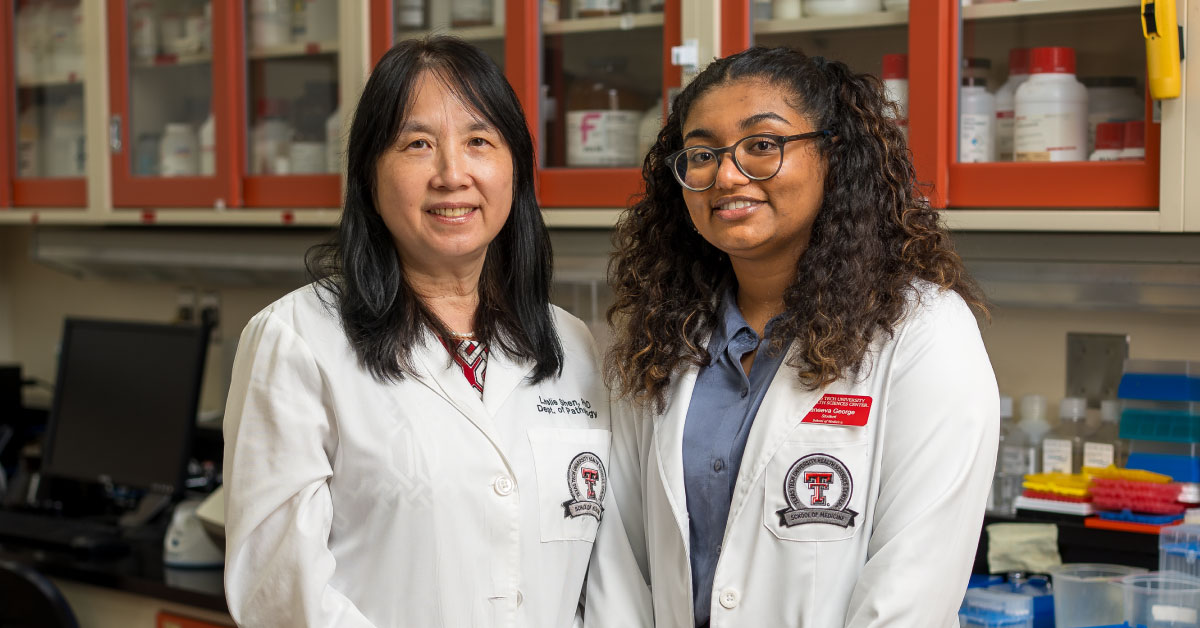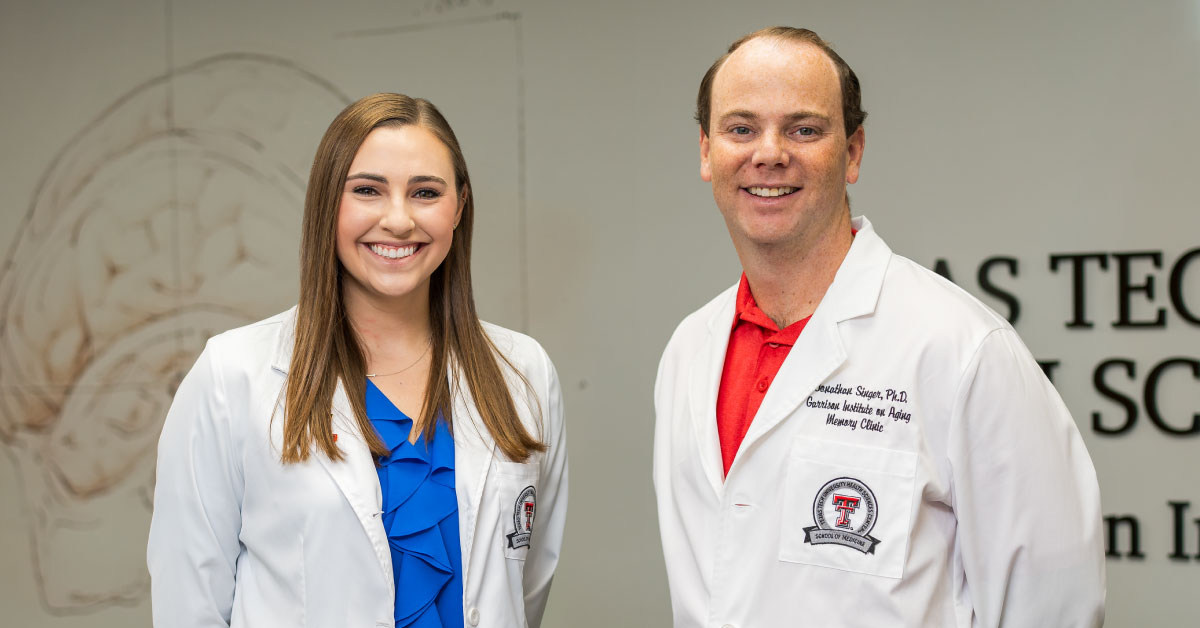Summer Program Introduces Medical Students to the Research Laboratory
Each year, approximately 100 first-year Texas Tech University Health Sciences Center (TTUHSC) School of Medicine students — more than half of the Lubbock class — step out of the classroom and into the laboratory to spend part of their summer making unique discoveries through the Medical Student Summer Research Program (MSSRP).
For more than a decade, the MSSRP has introduced TTUHSC medical students to the challenges and rewards of research. The eight-week summer elective also is where these students begin developing the skills they will use in their clinical and research fields of interest.
Students enrolled in the MSSRP don’t just collect data or analyze others’ findings. They participate in meaningful hands-on projects that teach them the next steps in the research process. To complete the program, these new student scientists present their project findings to peers, faculty and the community the following spring at the TTUHSC Graduate School of Biomedical Science’s Student Research Week.

Leslie Shen, Ph.D., and Saneeva George
Leslie Shen, Ph.D., the School of Medicine’s associate dean for research, created the MSSRP in 2010 to bolster students’ interest in clinical and basic science research by providing the opportunity to work with mentors in designing and executing a hands-on research project. Students also learn skills necessary to conduct successful research, such as bench work techniques and composing a literature review. In addition, they learn to use programs and techniques for working with data, and soft skills such as collaboration and project management.
“The MSSRP shows students firsthand the challenges of clinical, translational and basic science research that can arise from navigating the research regulatory and compliance landscape, accessing and analyzing data and handling setbacks while working with School of Medicine faculty mentors,” Shen said. “The program is a great way for students to familiarize themselves with their fields of interest through researching the topic and by working with expert mentors and clinicians. It also is a good opportunity to network with faculty and other students who can serve as future collaborators.”
Successful completion of the MSSRP also is a prerequisite to be eligible for the Distinction in Medical Research (DMR) Program, which students are introduced to the challenges of creating a funded research project from scratch and taught to promote their scholarly activities.
In fact, the MSSRP added a new feature in 2025 to complement the program’s firsthand research and mentor guidance. The new feature provides participants with eight hours of lectures by expert faculty from the DMR program. These experts discuss the various facets of designing and implementing a research study. Students who progress to the DMR receive credit for these MSSRP lectures.
During the 2025 MSSRP term, Shen mentored Saneeva George, who said she joined the program because she believes research is essential to medicine.
“I wanted to understand how new treatments are first discovered, how evidence is generated and how that evidence ultimately shapes evidence-based practice,” George said.
Under Shen’s mentorship, George’s project investigated whether a lipopolysaccharide (LPS) dose of 750 µg/kg (a microgram of medication per kilogram of the patient’s body weight) or 250 µg/kg more effectively induces a chronic fatigue–like phenotype in rats. George said chronic fatigue syndrome is a poorly understood condition marked by persistent fatigue and other debilitating symptoms without a clear cause. LPS is often used to model systemic inflammation and fatigue in animals, but prior work at 150 µg/kg did not yield a strong behavioral or inflammatory response.
“Our goal was to identify a more reliable dose to help create a reproducible animal model for future mechanistic and therapeutic studies,” George explained. “This project was a crash course in bench science and experimental troubleshooting. I learned RNA extraction, cDNA (copying DNA) synthesis, qPCR (real-time polymerase chain reactions) and how to critically evaluate protocols, troubleshoot unexpected challenges and collaborate effectively to solve problems in real time.”

Zoe Friedman and Jonathan Singer, Ph.D.
Zoe Friedman enrolled in the MSSRP because she wanted to engage in research and explore the impact it will have on her medical career. She also saw the program as a great way to build a foundation in research and enrich her education beyond the classroom. Friedman worked with mentor Jonathan Singer, Ph.D., a clinical psychologist who serves as director of TTUHSC’s Grief and Response to Illness into Late Life (GRILL) lab. He also is director of the TTUHSC Garrison Institute on Aging Comprehensive Memory Clinic and an assistant professor in the Texas Tech University Department of Psychological Sciences.
Friedman said she chose to work with Singer because his work with family caregivers of individuals with Alzheimer’s disease and Alzheimer’s disease-related dementias aligned closely with her personal interests.
“I had the unique experience of developing both valuable research-related and clinical skills,” Friedman said. “For example, I learned how to conduct a literature review, utilize theory to support aims and hypotheses and write a research paper from start to finish. In fact, I expect to submit the manuscript I wrote as part of MSSRP to a peer-reviewed journal featuring original research within the next month.”
In the Memory Clinic, Friedman said she gained an understanding of how to interact with dementia patients and their caregivers and how to discuss challenging topics with patients, such as advanced care planning. She also learned how to participate in consensus reviews with a multidisciplinary team that integrates MRI scans, laboratory tests, neurocognitive testing, neuropsychiatric evaluations and provider notes.
“Working with Dr. Singer was a rewarding experience that shaped me as both a future physician and researcher,” Friedman said. “I highly recommend the MSSRP to all future TTUHSC medical students.”
Friedman embraced the opportunity to work with family caregivers of persons with dementia and with fMRI (functional magnetic resonance imaging), an imaging technique that uses strong magnetic fields to create detailed images of brain activity. Despite her inexperience, Singer said Friedman took on a project that will make an impact on the field: utilizing fMRI to examine the relationship between pre-death grief and amygdala activation in family caregivers of persons with dementia during a grief elicitation task.
“I really enjoyed working with Zoe and learned so much from her,” Singer said. “Because of students like her, I have so much hope for the future of medicine.”
Singer said the MSSRP is the first time many students experience working on a research project and writing manuscripts and abstracts for conferences.
“Sometimes research is looked at as this nebulous and frightening experience, but the MSSRP program provides medical students a valuable summer experience,” Singer said. “It will impact their career whether they conduct research in the future or not.”
Shen said the MSSRP is not just for students who are interested in research or adding another line to their CV, but also for those who may be on the fence or who are not otherwise interested in research.
“Several students each year join the program with no great interest in research, only to come to the end of July with a new appreciation for research and a desire to continue their projects or topics into their later years of medical school,” she said.
Related Stories
TTUHSC Cancer Researcher Honored by National Academy of Inventors
C. Patrick Reynolds, M.D., Ph.D., director of the School of Medicine Pediatric Cancer Research Center at TTUHSC, has dedicated his life as a researcher to developing treatments for childhood cancers.
TTUHSC’s Hudson Set to Serve as President for Society of Clinical Research Associates
The Society of Clinical Research Associates (SOCRA) has elected Texas Tech University Health Sciences Center’s (TTUHSC) Catherine Hudson, Dr.P.H., as its president for 2025-2026.
Clinical Research Institute a Source of Pride for Retiring Griswold
Upon his retirement, John Griswold, M.D., reflects on the Clinical Research Institute and what it has achieved.
Recent Stories
The John Wayne Cancer Foundation Surgical Oncology Fellowship Program at Texas Tech University Health Sciences Center Announced
TTUHSC is collaborating with the John Wayne Cancer Foundation and has established the Big Cure Endowment, which supports the university’s efforts to reduce cancer incidence and increase survivability of people in rural and underserved areas.
TTUHSC Receives $1 Million Gift from Amarillo National Bank to Expand and Enhance Pediatric Care in the Panhandle
TTUHSC School of Medicine leaders accepted a $1 million philanthropic gift from Amarillo National Bank on Tuesday (Feb. 10), marking a transformational investment in pediatric care for the Texas Panhandle.
Texas Tech University Health Sciences Center Permian Basin Announces Pediatric Residency Program Gift
TTUHSC Permian Basin, along with the Permian Strategic Partnership and the Scharbauer Foundation, Feb. 5 announced a gift that will fund a new pediatric residency.
